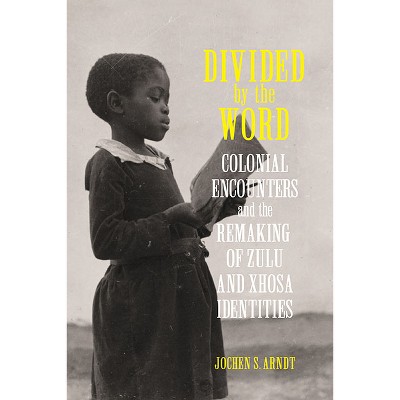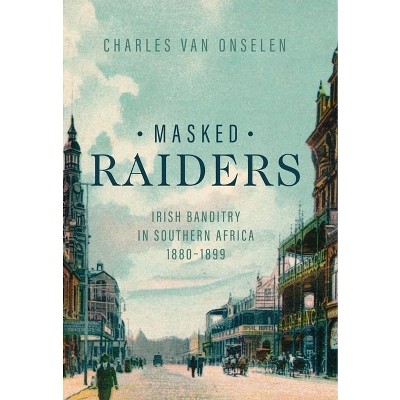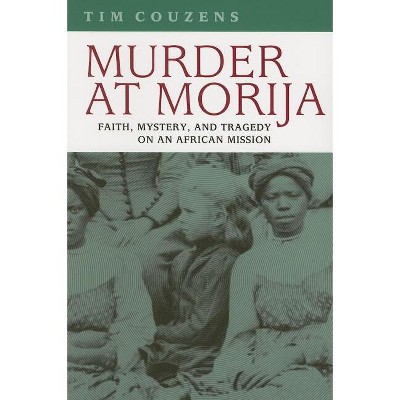The Finger of God - (Reconsiderations in Southern African History) 2nd Edition by Robert R Edgar (Hardcover)

About this item
Highlights
- On the morning of May 24, 1921, a force of eight hundred white policemen and soldiers confronted an African prophet, Enoch Mgijima, and some three thousand of his followers.
- About the Author: Robert R. Edgar, Professor of African Studies at Howard University and Stellenbosch University, South Africa, is the coauthor of African Apocalypse: The Story of Nontetha Nkwenkwe, a Twentieth-Century South African Prophet, among other books.
- 264 Pages
- History, Africa
- Series Name: Reconsiderations in Southern African History
Description
About the Book
Edgar asks: Why did Mgijima prophesize that the end of the world was imminent, and why did he summon his followers to Ntabelanga? Why did the South African government regard the Israelite encampment as a threat? Examining this clash between a government and a millenial movement, Edgar considers the Bulhoek massacre both as a signal event in South African history and as an example of similar conflicts worldwide.Book Synopsis
On the morning of May 24, 1921, a force of eight hundred white policemen and soldiers confronted an African prophet, Enoch Mgijima, and some three thousand of his followers. Called the Israelites, they refused to leave their holy village of Ntabelanga, where they had been gathering since early 1919 to await the end of the world. While the Israelites maintained they were there to pray and worship in peace, the white authorities viewed them as illegally squatting on land that was not theirs. After many months of fruitless negotiations, the South African government sent an armed force to Bulhoek, a village in the Eastern Cape, to expel them. In the event that has come to be known as the Bulhoek massacre, police armed with rifles, machine guns, and cannons killed nearly two hundred Israelites wielding knobkerries, swords, and spears.
In The Finger of God, Robert Edgar reveals how and why the Bulhoek massacre occurred. Edgar asks: Why did Mgijima prophesize that the end of the world was imminent, and why did he summon his followers to Ntabelanga? Why did the South African government regard the Israelite encampment as a threat? Examining this clash between a government and a millenial movement, Edgar considers the Bulhoek massacre both as a signal event in South African history and as an example of similar conflicts worldwide.
Review Quotes
Edgar's impressive scholarship is a fine contribution to religious studies, partic- ularly from the vantage point of the sociology of religion...The Finger of God: Enoch Mgijima, the Israelites, and the Bulhoek Massacre in South Africa suggests that such deadly violence may be avoided if government officials understand apocalyptic theology and why its devotees are committed to it.
--Josiah Ulysses Young III "The Journal of Religion"In The Finger of God, Robert Edgar gives us an unparalleled exploration of the motives, desires, and resentments of the prophet Enoch Mgijima and his followers as the Israelite movement gained strength in the early decades of last century.... [As] the post-anti-apartheid era drags on, many ostensibly secular political movements promote visions of a "de-colonized" future redolent of millenarianism. The Finger of God, thus, should not only be required reading for students of the Israelites and the Bullhoek massacre, but also for anyoneseeking to understand the sacred/secular dynamics of contemporary religious and political movements in South Africa today.
-- "International Journal of African Historical Studies"Robert Edgar's book The Finger of God: Enoch Mgijima, the Israelites, and the BulhoekMassacre is important in that it deals with an example of state brutality in South Africa, theBulhoek Massacre, which few other scholars have studied.... [T]he book is a valuable contribution to the history of South Africa, and it is a good revaluation of one of the very important events in South African history, in the wake of a new political dispensation.
-- "Journal of African History"Robert R. Edgar's title The Finger of God points to the importance of taking seriously the beliefs animating millenarian movements.... [He] has written a fine contribution to the literature probing why and how governments and millenarian movements understand each other sobadly, and so well.
-- "American Historical Review"The Bulhoek massacre was in its own time a matter of international comment, and did much to draw the attention of the world community to the problem of racial oppression in South Africa. Yet no attempt has been made since 1977 to address the topic at the academic level. The Finger of God will be the cause of widespread rejoicing. Edgar's writing is one of his greatest strengths as a historian. The narrative is gripping and carries the reader along with it.
--Jeff Peires, University of Fort HareThis is a remarkable book. Robert Edgar began researching this work on the Israelite Movement when he was a graduate student and has devoted much of his professional life to examining its origins, the actual movement, and its on-going influence in post-apartheid South Africa. There are few historians who have a stronger knowledge of the history of the Eastern Cape. He has exhaustively examined local and national archives, conducted oral histories at a time when that was extremely difficult under apartheid rule, and placed his rich evidence into a convincing narrative. He begins with a history of the Mfengu in the Eastern Cape, traces the history of prophetic movements in this region, and then focuses on the teaching and prophetic career of Enoch Mgjijima. He examines the debates about how to respond to his apocalypic movement of the Israelites, who gathered to await the apocalypse at Bullhoek, the trials of participants, and the divergent ways in which African and Europeans look back on their tragic, shared history. Robert Edgar's book will be the definitive work on the Israelite Movement and the massacred at Bullhoek.
--Robert M. Baum, Dartmouth College, author of West Africa's Women of God and the executive editor of the Journal of Religion in AfricaAbout the Author
Robert R. Edgar, Professor of African Studies at Howard University and Stellenbosch University, South Africa, is the coauthor of African Apocalypse: The Story of Nontetha Nkwenkwe, a Twentieth-Century South African Prophet, among other books.











